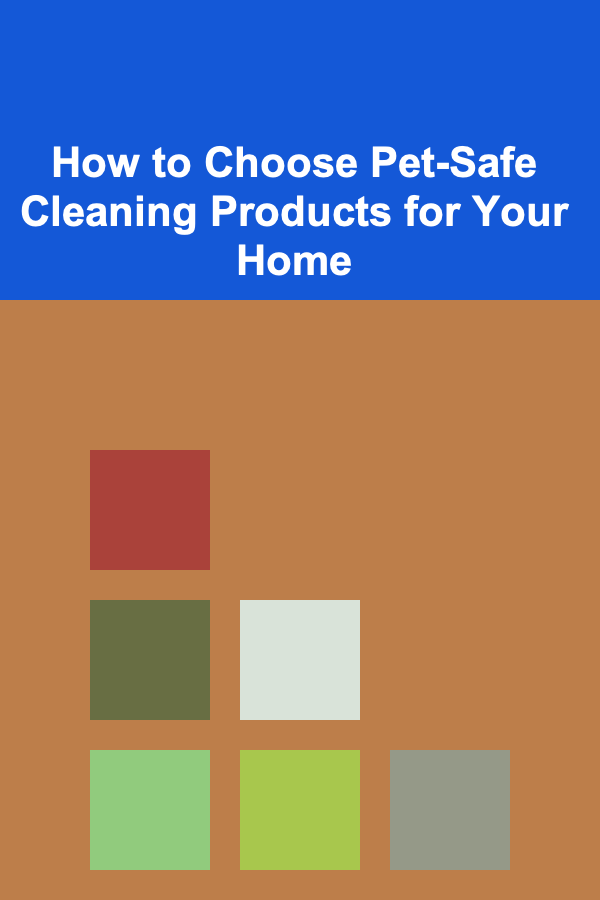
How to Choose Pet-Safe Cleaning Products for Your Home
ebook include PDF & Audio bundle (Micro Guide)
$12.99$5.99
Limited Time Offer! Order within the next:

As pet owners, we want to provide our furry, scaly, or feathered friends with a safe and healthy environment. One crucial aspect of maintaining a safe home is selecting the right cleaning products. Many traditional cleaning supplies can contain harmful chemicals that are toxic to pets, leading to serious health risks or even death if ingested, inhaled, or absorbed through their skin. Therefore, it is essential to choose cleaning products that are pet-safe while still maintaining a clean and sanitary environment for both your pets and family members.
In this comprehensive guide, we'll delve deep into the importance of selecting pet-safe cleaning products, the risks associated with common cleaning chemicals, and how to make informed decisions when purchasing and using cleaning supplies. We'll also explore natural alternatives, key ingredients to avoid, and the best practices for keeping your home clean without compromising your pet's health.
Why Pet-Safe Cleaning Products Matter
Pets, especially cats, dogs, birds, and small mammals, are often exposed to chemicals in cleaning products because they interact with surfaces in ways that humans do not. Pets lick, sniff, and groom themselves by coming into contact with floors, furniture, and other areas where cleaning products are used. Additionally, many cleaning products release fumes that can irritate their respiratory systems. For example, ammonia, bleach, and certain air fresheners are known to cause long-term damage to pets when exposed to them in high amounts.
Choosing pet-safe cleaning products is essential for the following reasons:
- Health and Safety: Many cleaning products contain toxic chemicals that can harm pets if ingested, inhaled, or absorbed through their skin. These chemicals can cause immediate symptoms like vomiting, diarrhea, skin irritation, or respiratory distress. In severe cases, exposure to these products may lead to long-term health issues or even death.
- Environmental Impact: Pet-safe cleaning products often have fewer harsh chemicals, which means they are less likely to contribute to environmental pollution. Many commercial cleaning products can release harmful substances into the air and water systems, impacting wildlife and ecosystems.
- Peace of Mind: By using pet-safe cleaning products, you can be confident that you are protecting your pets from potential harm while keeping your home clean. This peace of mind is priceless for pet owners who prioritize the well-being of their pets.
Common Harmful Chemicals in Household Cleaning Products
Before we dive into the specifics of choosing pet-safe cleaning products, it's essential to be aware of the harmful chemicals commonly found in household cleaning supplies. Here are some of the most dangerous substances you may encounter:
1. Ammonia
Ammonia is a common ingredient in many household cleaners, including glass cleaners and degreasers. It emits strong fumes that can irritate the respiratory system of pets, leading to coughing, wheezing, and difficulty breathing. Ingesting ammonia can cause serious gastrointestinal distress, including nausea and vomiting.
2. Bleach
Bleach is an effective disinfectant and stain remover, but it is also highly toxic to pets. Ingesting bleach or even inhaling its fumes can lead to severe poisoning. Symptoms of bleach poisoning in pets include drooling, vomiting, diarrhea, and burns to the mouth and throat. Cats and dogs are particularly vulnerable to bleach poisoning due to their grooming habits.
3. Phthalates
Phthalates are chemicals often found in air fresheners, air sprays, and other scented cleaning products. These chemicals can disrupt hormonal functions in both humans and pets, leading to long-term health problems. Phthalates are often absorbed through the skin, so pets can be exposed to them when they come into contact with treated surfaces.
4. Formaldehyde
Formaldehyde is a toxic substance used in various cleaning products, especially disinfectants and sanitizers. Prolonged exposure to formaldehyde can cause respiratory issues and irritation to the eyes and skin. It is also classified as a carcinogen, making it especially dangerous for pets that are exposed to it regularly.
5. Chlorine
Chlorine bleach and other chlorine-based cleaners are not only harmful to pets when ingested but also to their sensitive skin. Chlorine can cause skin burns, gastrointestinal upset, and respiratory problems. Pet birds are particularly sensitive to chlorine fumes, and exposure to even low levels of chlorine can be fatal.
6. Cationic Surfactants
Commonly found in fabric softeners and disinfecting wipes, cationic surfactants can be toxic to pets, particularly cats. Ingesting or inhaling these chemicals can cause liver damage, respiratory issues, and skin irritation.
7. Isopropyl Alcohol
Isopropyl alcohol is frequently used in disinfecting wipes, hand sanitizers, and surface cleaners. While it is effective at killing bacteria, it is also highly toxic to pets if ingested. Symptoms of alcohol poisoning in pets include lethargy, vomiting, and in severe cases, coma or death.
How to Choose Pet-Safe Cleaning Products
Now that we know which chemicals to avoid, let's explore how to choose pet-safe cleaning products. When shopping for cleaning products, it's essential to prioritize the following factors to ensure that your cleaning supplies are safe for pets.
1. Look for Natural Ingredients
Natural cleaning products often use ingredients like vinegar, baking soda, lemon juice, and essential oils, which are much safer for pets than their chemical counterparts. Many natural cleaners are equally effective at cleaning and disinfecting without exposing your pets to harmful toxins.
- Vinegar: Vinegar is an excellent natural cleaner with mild disinfectant properties. It can be used to clean surfaces, remove stains, and even neutralize odors. It's safe for pets and can be diluted with water to create an effective cleaning solution.
- Baking Soda: Baking soda is a gentle abrasive cleaner that can be used to scrub surfaces and remove odors. It is completely safe for pets and can be mixed with water to create a paste for cleaning tough stains.
- Lemon Juice: Lemon juice is an effective natural disinfectant and deodorizer. It has antibacterial properties and is safe for use around pets, though it's essential to ensure that your pet doesn't ingest large quantities of it.
- Essential Oils: While some essential oils are safe for pets, many are toxic, especially to cats and birds. It's crucial to research the specific oils used in pet-safe cleaning products before use. Essential oils like lavender and peppermint are generally safe for most pets when used in small amounts, but they should always be diluted.
2. Check for Pet-Safe Certifications
Many manufacturers offer cleaning products specifically labeled as "pet-safe" or "pet-friendly." These products are often made with non-toxic ingredients and are free from harmful chemicals. Look for certifications such as:
- Cruelty-Free: Products labeled as cruelty-free are not tested on animals and typically avoid harmful chemicals, making them safer for pets.
- EPA Safer Choice: This certification indicates that the product has been evaluated by the Environmental Protection Agency (EPA) and meets specific environmental and health standards. Products with this label are less likely to contain harmful chemicals and are generally safer for both pets and people.
- Green Seal or EcoLogo: These certifications indicate that the product meets rigorous environmental standards. Products with these labels are often made with non-toxic ingredients and are biodegradable, making them a safer option for homes with pets.
3. Avoid Harsh Fragrances and Dyes
Fragrances and dyes used in many cleaning products can be irritating to pets, particularly those with sensitive respiratory systems, like birds and rabbits. Avoid cleaning products with artificial fragrances and opt for those that use natural scents or are fragrance-free. If you want a natural scent, look for products with essential oils (as mentioned above), but ensure they are pet-safe.
4. Ensure Thorough Rinsing
Even with pet-safe products, it's important to rinse cleaned surfaces thoroughly, especially when it comes to floors, countertops, or any areas where your pet is likely to come into direct contact. This minimizes any lingering residue that could be harmful to your pet.
5. Read Labels and Ingredients
When selecting pet-safe cleaning products, always read the labels carefully. Look for ingredients such as:
- Coconut-based surfactants: These are gentle on both your pet and the environment. They are effective at cleaning without the harshness of chemical surfactants.
- Plant-based solvents: Derived from natural sources, these solvents are safer for both pets and humans.
- Baking soda and citric acid: Commonly found in natural cleaners, these ingredients are effective for deodorizing and removing stains.
Be wary of vague claims such as "eco-friendly" or "natural," as these terms are not regulated and may still contain harmful ingredients. Always research the product and the manufacturer to ensure it is truly safe for pets.
Natural Alternatives and DIY Pet-Safe Cleaners
For pet owners who prefer a more hands-on approach, making your own pet-safe cleaning products can be a great option. Here are a few simple DIY recipes:
1. All-Purpose Cleaner
Mix equal parts of water and white vinegar in a spray bottle. Add a few drops of pet-safe essential oil, such as lavender or eucalyptus, for a fresh scent. This cleaner is perfect for countertops, sinks, and floors.
2. Pet Stain Remover
Combine 1 cup of water, 1 cup of vinegar, and 2 tablespoons of baking soda. Shake the mixture to dissolve the baking soda, and apply to pet stains on carpets or furniture. Let it sit for 15-20 minutes before blotting with a clean cloth.
3. Pet-Safe Air Freshener
Combine 2 cups of water with 10 drops of pet-safe essential oil. Pour the mixture into a spray bottle and use it as an air freshener throughout your home. Be sure to avoid spraying it directly on your pet or their belongings.
Best Practices for Cleaning Around Pets
Even with pet-safe cleaning products, it's important to follow these best practices to minimize any risks to your pets:
- Ventilate your home: Open windows and doors while cleaning to ensure that any fumes or chemicals are dispersed. Good ventilation will help reduce your pet's exposure to any airborne irritants.
- Keep pets away while cleaning: Whenever possible, keep your pets in a separate room while you're cleaning. This will ensure that they are not exposed to cleaning products or surfaces that may still have residue.
- Store cleaning products safely: Even pet-safe cleaners should be kept out of reach of pets. Store them in a secure cabinet or shelf that your pets cannot access.
Conclusion
Choosing pet-safe cleaning products is essential to ensuring the health and well-being of your pets while keeping your home clean and sanitary. By selecting natural, non-toxic cleaners, reading labels carefully, and following best practices for safe cleaning, you can create a home environment that is both clean and safe for your pets. Always remember that your pets' safety is a top priority, and with the right cleaning products and practices, you can maintain a safe and healthy home for everyone in your household.

From Risk to Regulation: A Compliance Officer's Guide to Staying Ahead
Read More
How to Create a Time Management Checklist for Evening Routines
Read More
How to Decorate Your Walls Without Spending a Fortune
Read More
How to Start a Homemade Jam Business in Your Spare Time
Read More
How To Understand Off-Flavors in Beer and How to Avoid Them
Read More
How to Get Started with Yoga for Fitness
Read MoreOther Products

From Risk to Regulation: A Compliance Officer's Guide to Staying Ahead
Read More
How to Create a Time Management Checklist for Evening Routines
Read More
How to Decorate Your Walls Without Spending a Fortune
Read More
How to Start a Homemade Jam Business in Your Spare Time
Read More
How To Understand Off-Flavors in Beer and How to Avoid Them
Read More